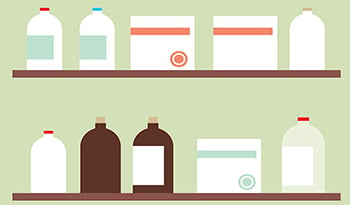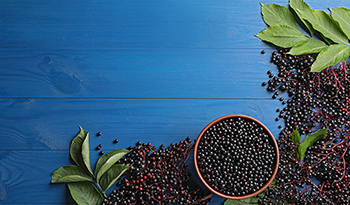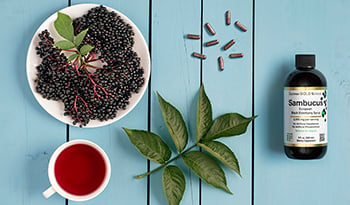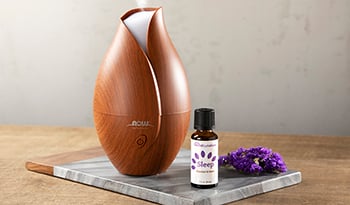3 поради, які допоможуть зміцнити імунну систему за 24 години

Ви відчуваєте стрес, перевантажені напруженим графіком і не висипаєтесь. Раптом тобі стає погано. Починається з болю в горлі, нежитю та легкого головного болю. Через кілька годин ви відчуваєте озноб, біль у м'язах і втому, що ускладнює роботу. Очевидно, що ваше тіло говорить: "Сповільнись і подвої зусилля по догляду за собою", - благає воно, але у кого є на це час?
Хоча чарівного рішення для повного знищення інфекції не існує, існує безліч природних підходів, які ви можете застосувати для зміцнення імунної системи. Це може підтримати ваш організм у боротьбі з вірусом, таким як застуда або грип.
Розуміння імунної системи
Подібно до армії з багатьма підрозділами, ваша імунна система - це складний захисний комплекс, що складається з різних клітин, хімічних речовин, тканин і органів. Він працює 24/7, постійно захищаючи ваш організм від шкідливих речовин (вірусів, бактерій і токсинів) і захищаючи його від хвороб та інфекцій.
Перша лінія захисту - це шкіра, шлунковий сік, дружні бактерії та слизові оболонки. Подібно до стін фортеці, ці фізичні та хімічні бар'єри запобігають проникненню патогенних мікроорганізмів і поширенню їх по всьому тілу.
Якщо загарбник долає першу лінію захисту, спрацьовує ваша вроджена (природна) імунна система. Клітини, які називаються фагоцитами, ідентифікують і знищують чужорідні клітини. Якщо вони не можуть впоратися з інфекцією, вони випускають посланців, які називаються цитокінами, що закликають резервні клітини (лімфоцити) вступити в бій.
3 поради для зміцнення імунної системи
Щоб ефективно працювати, оптимально функціонувати та боротися з хворобами, ваша імунна система потребує тренувань, балансу та підтримки. Боротьба зі стресом, дієта, багата на фрукти, овочі та цільнозернові продукти, прийом хороших полівітамінів (для забезпечення поживними речовинами) (щоб забезпечити отримання всіх необхідних поживних речовин), регулярні фізичні вправи, повноцінний сон і питна вода - це важливі довгострокові стратегії, які допомагають підтримувати імунну систему сильною.
Однак, навіть якщо ви ретельно дбаєте про своє тіло, ви все одно можете бути вразливими до інфекцій. На щастя, існують кроки, які можна зробити, щоб швидко зміцнити імунну систему. Ось кілька пропозицій.
Отримати достатній відпочинок
Сон перезавантажує імунну систему і має великий вплив на здатність організму боротися з інфекціями. Тому, як тільки ви відчуваєте, що виснажені, відключіться від мережі, подрімайте і лягайте спати раніше.
Ваш організм виробляє кілька типів клітин та антитіл, які борються з інфекціями, поки ви спите. Під впливом вірусів ви не лише частіше хворієте, але й погано спите, тому що одужання може зайняти більше часу. Дослідження 2015 року показало, що люди, які сплять менше шести годин на добу, більш ніж у чотири рази частіше застуджуються, ніж ті, хто спить більше семи годин.
Маєте проблеми зі сном? Створіть режим сну. Лягайте спати і прокидайтеся в один і той же час щодня. Вимкніть електроніку приблизно за годину до відпочинку. Тримайте кімнату в темряві та прохолоді. Уникайте кофеїну, великих порцій їжі та алкоголю перед сном.
Прийом мелатонінугормону, що виробляється організмом природним чином, може сприяти відпочинку. Деякі трави також можуть покращити сон, зокрема валеріана, ромашкаі пасифлора. . Занурення в теплу ванну із заспокійливими ефірними оліями, такими як лаванда , або чашка чаю із заспокійливими травами, такими як хміль та ройбуш , сприяють розслабленню, і ви швидше засинаєте.
Використовуй горщик.
Розроблений століття тому в Індії, неті-пот - це ємність, яку ви наповнюєте фізіологічним розчином і використовуєте для промивання носових ходів. Це допоможе зменшити симптоми застуди та грипу, полегшити сухість у носі та головний біль у пазухах. Систематичний огляд показав, що промивання носа та горла для профілактики та лікування інфекцій верхніх дихальних шляхів ефективне для багатьох поширених вірусів.
Посильте здоровий раціон за допомогою добавок, що підвищують імунітет
Хоча жодна добавка не може запобігти або вилікувати хворобу, низка вітамінів, мінералів, трав та інших продуктів може покращити реакцію вашої імунної системи на інфекцію.
Вітамін C
Вітамін С зазвичай є першою добавкою, за якою люди звертаються, коли починають хворіти, і небезпідставно. Наукова група експертів дійшла висновку, що існує причинно-наслідковий зв'язок між споживанням вітаміну С з їжею та нормальним функціонуванням імунної системи.
Цей незамінний вітамін, також відомий як аскорбінова кислота, міститься у високих концентраціях в імунних клітинах і відіграє багато важливих ролей у регулюванні імунної системи. Як антиоксидант, він допомагає зменшити запалення. Він також підвищує активність фагоцитів і сприяє проліферації лімфоцитів.
Хоча дослідження не показали, що вживання вітаміну С знижує ймовірність застуди, мета-аналіз 29 контрольованих досліджень, які вивчали переваги щоденного вживання принаймні 200 мг вітаміну С, показав, що це зменшує тривалість і тяжкість застуди. Інше дослідження показало, що серед людей, які тренувалися в холодному кліматі, ті, хто приймав вітамін С для профілактики застуди, вдвічі знижували свої шанси на розвиток застуди.
Вітамін D
Вітамін D"сонячний" вітамін, є важливим жиророзчинним вітаміном, який використовується всіма клітинами організму. Присутній лише в деяких продуктах (жирна риба та гриби шиітаке) і часто додається до інших (зокрема, молочних продуктів), вітамін D також виробляється під впливом сонячних променів на шкіру.
Окрім сприяння засвоєнню кальцію та росту кісток, вітамін D є важливим стимулятором вродженого імунітету. Він підвищує здатність білих кров'яних тілець боротися з мікробами та зменшує запалення. Аналіз 24 рандомізованих контрольованих досліджень за участю 11 321 суб'єкта показав, що "вживання вітаміну D є безпечним і захищає від ГРЗ" (гострих респіраторних інфекцій).
Майже половина населення світу відчуває дефіцит вітаміну D, і більшість людей у США не отримують його достатньо, споживаючи менше рекомендованої дози 400-800 МО. Хоча наразі немає згоди щодо оптимального рівня споживання вітаміну D, а також безпечного верхнього рівня, Інститут медицини вважає, що до 4000 МО/добу (100 мкг) є безпечним для дорослих.
Вітамін E
Потужний антиоксидант, що міститься в рослинних оліях, горіхах насінніта листовій зелені, вітамін Е відіграє важливу роль у зміцненні імунітету. Дослідження показують, що вживання вітаміну Е підвищує клітинний імунітет, особливо у літніх людей.
Хоча дефіцит вітаміну Е рідко зустрічається у здорових людей, більшість американців отримують менше, ніж рекомендовано для дорослих (15 мг), лише з їжею. Прийом хорошої полівітамінно-мінеральної добавки яка зазвичай містить близько 13 мг, може забезпечити вам достатню кількість вітамінів.
Цинк
Міститься в багатьох продуктах, включаючи морепродукти, квасолю горіхах, червоному м'ясі та птиці. червоному м'ясі та птиці, цинк є важливим мінералом, необхідним для належного функціонування вашої імунної системи. Цинк допомагає вбивати віруси та бактерії і необхідний клітинам, що беруть участь у формуванні вродженого імунітету. Коли клітини і тканини зазнають запалення, цинк також діє як антиоксидант, стабілізуючи мембрани і запобігаючи пошкодженню нормальних клітин вільними радикалами.
Добавки цинку використовуються як терапевтичний і профілактичний засіб при багатьох інфекціях дихальних шляхів і застуді. Аналіз досліджень із застосуванням цинку для лікування або профілактики застуди показав, що "цинк, введений протягом 24 годин після появи симптомів, скорочує тривалість і тяжкість застуди у здорових людей".
Понад 20 відсотків населення світу відчувають дефіцит цинку. Дослідження показали, що навіть незначний дефіцит цинку може негативно вплинути на вашу імунну систему. Загалом, споживання дорослими до верхньої добової межі (40 мг) вважається безпечним.
Екстракт листя оливкового дерева
Оливкове листя у вигляді екстракту, чаю або порошку століттями використовувалося в Європі та Середземномор'ї як традиційний лікувальний засіб. Листя містить природну рослинну хімічну речовину олеуропеїн, яка має імуностимулюючі, противірусні, антибактеріальні, протигрибкові та антиоксидантні властивості.
Хоча для визначення впливу екстракту листя оливкового дерева на імунну систему потрібні додаткові дослідження, дослідження в пробірках показали, що він має противірусні властивості та здатність вбивати шкідливі мікроорганізми, включаючи кандиду та кишкову паличку.
Пробіотики
Дружні бактерії, які називаються пробіотиками , відомі своєю здатністю зміцнювати здоров'я кишечника, покращувати деякі психічні стани та заспокоювати розлади травлення. Багато людей не усвідомлюють, що оскільки значна частина імунної системи знаходиться у шлунково-кишковому тракті, вживання пробіотиків може її зміцнити.
Незалежно від того, чи приймаються вони як добавка, чи ферментовані (тобто йогурт, комбуча, місо, квашена капуста та кефір), пробіотики мають численні позитивні ефекти на імунітет. Вони стимулюють імунну систему і запускають вироблення цитокінів. Крім того, ці дружні бактерії зміцнюють кишечник, щоб він міг зупинити ріст потенційно шкідливих бактерій. Дослідження також показали, що регулярне вживання пробіотиків може зменшити ваші шанси захворіти на інфекцію верхніх дихальних шляхів.
Часник
Часник століттями використовувався в медицині для профілактики та лікування хвороб. Він не лише покращить смак вашого супу чи смаженої картоплі, але й покращить роботу імунної системи, стимулюючи певні клітини. Дослідження показало, що порівняно з контрольною групою, люди, які приймали добавку з екстрактом витриманого часнику, збільшили проліферацію природних імунних клітин і, як виявилося, менше хворіли на застуду та грип.
Хоча необхідні додаткові клінічні дослідження на людях, щоб довести його користь для імунної системи, часник має протизапальні, антисептичні, протигрибкові, антибіотичні та антиоксидантні властивості і може допомогти організму вбивати віруси та інші шкідливі мікроорганізми.
Під час сезону застуди та грипу і пандемії особливо важливо знати, як піклуватися про свою імунну систему та зміцнювати її для боротьби з вірусними інфекціями. Не обов'язково впроваджувати всі згадані заходи. Почніть з того, що дбайте про своє тіло постійно, а не лише тоді, коли у вас нежить. Зробіть імунне здоров'я головним пріоритетом, і ви максимально покращите своє здоров'я та самопочуття.
Джерела:
- Hemilä H. Vitamin C and Infections. Поживні речовини. 2017 Mar 29;9(4):339. doi: 10.3390/nu9040339. PMID: 28353648; PMCID: PMC5409678. https://pubmed.ncbi.nlm.nih.gov/28353648/
- Hemilä H. Цинкові пастилки та застуда: мета-аналіз порівняння ацетату цинку та глюконату цинку, а також роль дозування цинку. JRSM Open. 2017 May 2;8(5):2054270417694291. doi: 10.1177/2054270417694291. PMID: 28515951; PMCID: PMC5418896. https://pubmed.ncbi.nlm.nih.gov/28515951/
- Maldonado Galdeano C, Cazorla S, I, Lemme Dumit J, M, Vélez E, Perdigón G: Позитивний вплив споживання пробіотиків на імунну систему. Ann Nutr Metab 2019;74:115-124. doi: 10.1159/000496426 https://www.karger.com/Article/FullText/496426#
- Маркін Д., Дуек Л., Бердичевський І. Антимікробна активність листя оливи in vitro. Мікози. 2003 Apr;46(3-4):132-6. doi: 10.1046/j.1439-0507.2003.00859.x. PMID: 12870202. https://pubmed.ncbi.nlm.nih.gov/12870202/
- Martineau AR et al. Добавки вітаміну D для профілактики гострих респіраторних інфекцій: мета-аналіз індивідуальних даних учасників. Health Technol Assess. 2019 Jan;23(2):1-44. doi: 10.3310/hta23020. PMID: 30675873; PMCID: PMC6369419. https://pubmed.ncbi.nlm.nih.gov/30675873/
- Nair R, Maseeh A. Вітамін D: вітамін "сонячного світла". J Pharmacol Pharmacother. 2012 Apr;3(2):118-26. doi: 10.4103/0976-500X.95506. PMID: 22629085; PMCID: PMC3356951.
- Nantz MP et al. Прийом екстракту витриманого часнику покращує функцію NK- і γδ-T-клітин та зменшує вираженість симптомів застуди та грипу: рандомізоване, подвійне сліпе, плацебо-контрольоване дієтологічне втручання. Clin Nutr. 2012 Jun;31(3):337-44. doi: 10.1016/j.clnu.2011.11.019. Epub 2012 Jan 24. PMID: 22280901. https://pubmed.ncbi.nlm.nih.gov/22280901/
- Prasad AS, Beck FW, Bao B, Fitzgerald JT, Snell DC, Steinberg JD, Cardozo LJ. Прийом цинку знижує частоту інфекцій у літніх людей: вплив цинку на вироблення цитокінів та оксидативний стрес. Am J Clin Nutr. 2007 Mar;85(3):837-44. doi: 10.1093/ajcn/85.3.837. PMID: 17344507. https://pubmed.ncbi.nlm.nih.gov/17344507/
- Prather AA, Janicki-Deverts D, Hall MH, Cohen S. Поведінкова оцінка сну та сприйнятливості до застуди. Сон. 2015 Sep 1;38(9):1353-9. doi: 10.5665/sleep.4968. PMID: 26118561; PMCID: PMC4531403.
- Prietl B, Treiber G, Pieber TR, Amrein K. Вітамін D та імунна функція. Поживні речовини. 2013;5(7):2502-2521. Опубліковано 2013 Jul 5. doi:10.3390/nu5072502 https://www.ncbi.nlm.nih.gov/pmc/articles/PMC3738984/
- Resta-Lenert S, Barrett KE. Живі пробіотики захищають клітини кишкового епітелію від впливу інфекції ентероінвазивної кишкової палички (EIEC). Gut. 2003 Jul;52(7):988-97. doi: 10.1136/gut.52.7.988. PMID: 12801956; PMCID: PMC1773702. https://pubmed.ncbi.nlm.nih.gov/12801956/
- Сінгх М., Дас Р.Р. Цинк при застуді. Cochrane Database Syst Rev. 2011 Feb 16;(2):CD001364. doi: 10.1002/14651858.CD001364.pub3. Оновлення в: Cochrane Database Syst Rev. 2013;6:CD001364. PMID: 21328251. https://pubmed.ncbi.nlm.nih.gov/21328251/
- Singh S, Sharma N, Singh U, Singh T, Mangal DK, Singh V. Промивання носоглотки у профілактиці та лікуванні інфекцій верхніх дихальних шляхів: Чи може воно запобігти COVID-19? Lung India. 2020;37(3):246-251. doi:10.4103/lungindia.lungindia_241_20
- Wessels I, Maywald M, Rink L. Zinc as a Gatekeeper of Immune Function. Поживні речовини. 2017;9(12):1286. Опубліковано 2017 Листопад 25. doi:10.3390/nu9121286 https://www.ncbi.nlm.nih.gov/pmc/articles/PMC5748737/
ВІДМОВА ВІД ВІДПОВІДАЛЬНОСТІ:Інформація, що міститься в Центрі здоров'я, не призначена для встановлення діагнозу...
















































































 Зміст
Зміст
















